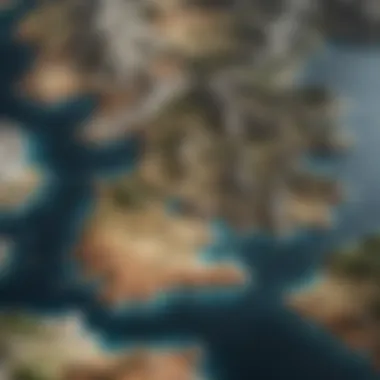Exploring the Depths of the Game of Thrones Novels


Intro
The world of Game of Thrones has captivated millions around the globe, not solely due to its gripping television adaptation, but for a multitude of reasons intertwined within George R.R. Martin's novels. This exploration dives into the intricate tapestry of character arcs, thematic depth, and the expansive lore that forms the backbone of this masterful series. At its core, the storytelling is rich and layered; each character not only exists in their world but contributes profoundly to the saga of Westeros.
As we embark on this journey, we examine how the unique narrative structure, compelling character development, and cultural implications elevate the novels beyond mere entertainment. The series doesn’t shy away from morally ambiguous choices, leaving readers constantly analyzing and questioning the motivations behind each character's actions.
With talk surrounding the differences between the books and their televised counterparts, dedicated fans often find themselves debating which version better captures Martin's intent. By addressing these facets, we aim to unravel the layers and provide insights that both casual readers and hardcore fans will find appealing.
Character Dissections
Detailed Analysis of Key Characters in Game of Thrones
Within the pages of the Game of Thrones series, characters frequently exhibit multi-dimensional traits that resonate with audiences. The complexity of figures like Jon Snow, Daenerys Targaryen, and Tyrion Lannister exemplifies how their personal journeys are skillfully woven into the broader storyline.
Take Jon Snow, for instance. Initially portrayed as the quiet, duty-bound Stark bastard, he evolves into a leader grappling with honor and sacrifice. His journey from the cold walls of the Night's Watch to the complexities of the North showcases a profound exploration of identity and loyalty. Jon not only embodies the themes of cherished honor but also the harsh reality of leadership amidst chaos.
Character Development Throughout the Series
Character growth is central to the Game of Thrones narrative. Each arc adds depth and reveals the characters’ reactions driven by the ever-changing landscape of Westeros. Daenerys Targaryen begins as a pawn in her brother's game, transforming into a formidable force willing to lay waste to obstacles in her path. Her development raises questions about power and morality, exploring the fine line between liberation and tyranny.
Moreover, characters like Cersei Lannister and Jaime Lannister undergo twisting paths of growth, demonstrating how ambition and desperation can warp even the most rigid morals. Cersei's ruthless pursuit of power, evident in her machinations, stands in stark contrast to Jaime's gradual transformation—from a seemingly two-dimensional villain to a character riddled with internal conflict and remorse.
Impact on the Overarching Storyline
Characters in the Game of Thrones series do not exist in isolation. Instead, their choices ripple through the fabric of Westeros, affecting the lives and destinies of those around them. The intertwining fates of the Stark family amid the chaos of political intrigue cause readers to reflect on the deeper implications of each character's journey. In essence, every character's evolution is crucial to the unfolding saga, making the narrative an exquisite tapestry woven with ambition, betrayal, and redemption.
"In the world of Game of Thrones, every choice has a consequence, and every character bears the weight of that truth."
As we delve deeper into the novel's lore and thematic elements, it becomes clear that character dissections are not merely an analysis of traits. They serve as a lens through which we can better understand the intricate world George R.R. Martin has created.
Lore Explorations
Delving into the Rich History and Lore of Westeros
Westeros is a realm laden with histories that echo through its landscapes, from the iron throne to the vast beyond the Wall. Each location, be it King's Landing or Dorne, carries stories aplenty—tales of conquest, betrayal, and the enduring echoes of houses that once stood proud.
An understanding of this lore enhances the reading experience, revealing layers beneath the surface narrative. For instance, the connection between the Targaryens and their dragons transcends mere mythology; it speaks to the very soul of power and its potential for destruction when intertwined with human ambition.
Uncovering Hidden Details and Connections
Martin embeds subtle clues within the text that fans often latch onto, unraveling deeper meanings. The histories of houses, the significance of sigils, or the influence of ancient prophecies all contribute to a larger narrative. Unpacking these elements fosters a richer understanding for readers, transforming their engagement from passive to deeply analytical.
Exploring the Cultural and Mythical Aspects of the World
Culturally, Westeros mirrors real-world history, politics, and socio-economic structures. The influence of the War of the Roses and various historical events shape the framework of Martin's storytelling. Furthermore, tales like the legendary Hero of Ages, woven into the fabric of Westeros, provide an avenue to explore the mythical and the mundane in a world where neither truly exists without the other.
This intertwining of history and myth reflects on our society, making Game of Thrones a commentary on power, belief, and human nature.
Fan Theories
Compilation of Popular and Intriguing Fan Theories
The Game of Thrones series has sparked myriad fan theories, ranging from the plausible to the downright bizarre. Some fans speculate that Jon Snow is not merely a Stark but rather the culmination of Targaryen legacy. Others suggest that certain subtle clues hint at the true identity of the infamous figure behind the Iron Throne, ultimately leading to a shocking revelation.
Evaluation of Theories Based on Evidence from the Show
Evaluating these fan theories against the events of the books and the television adaptation adds a fun dimension to discussions. For example, the idea of R+L=J (Rhaegar Targaryen and Lyanna Stark's relationship) is intricately woven into the story, rewarding observant readers and offering them the thrill of discovery.
Speculation on Future Plot Developments
As the saga progresses, the ongoing discussions surrounding potential plot developments keep the fandom alive. Fans continually anticipate how the intricate threads of narrative might converge or diverge, often clinging to their favorite characters' fates while daring to dream of unexpected alliances and betrayals. The speculation fuels discussions and drives fan engagement, ensuring that the legacy of Game of Thrones continually evolves with each new theory.
Prelude to Game of Thrones Literature


The realm of literature sounds eclectic already, but when we bring Game of Thrones into the fold, it becomes even more compelling. The series, sprawling across multiple volumes, is not merely a tale of fantastical kingdoms and mythical creatures; it's a canvas showcasing the intricate interplay of power dynamics, loyalty, betrayal, and human nature itself. In this dive, we will peal back layers that make the Game of Thrones series not just a story but a deep exploration of societal constructs, governance, and moral dilemmas that resonate with readers on many levels.
Starting from the very first novel, A Game of Thrones, and extending to the subsequent titles, each installment invites readers into a world where the stakes are high, and survival often rests upon cleverly laid plans. It's this riveting narrative that hooks casual readers and hardcore fans alike.
Overview of the Series
When George R.R. Martin envisioned the A Song of Ice and Fire series, he set forth to construct a world teeming with complexity. The Game of Thrones novels emerge from a rich backdrop filled with unique histories, cultures, and intricate character relationships. Readers follow families like the Starks, Lannisters, and Targaryens as they navigate the bloody politics of Westeros.
The series challenges traditional fantasy norms, ditching the clear-cut morality often found in other tales. It invites introspection as characters grapple with choices that defy societal expectations. For instance, while the Stark family embodies honor, their downfall is often tied to strict adherence to these very ideals. This tension is heightened throughout the chapters, keeping readers at the edge of their seats, never sure who might fall next.
Furthermore, Martin exhibits a talent for twisting narratives, where beloved characters may meet grim fates without warning. This stark realism in character arcs shapes the reader's understanding of Game of Thrones as something more than mere fiction; it elevates it into a study on the human psyche and ambition.
Author's Background: George R.R. Martin
Delving into the mind behind Game of Thrones, we encounter George R.R. Martin—a writer, editor, and television producer whose journey is as fascinating as his works. Born in 1948 in Bayonne, New Jersey, Martin developed a passion for storytelling from a young age. He began writing short stories in his childhood, often drawing inspiration from comic books and the various tales he consumed.
His background in journalism and television scripting laid a solid foundation for his future novels. Martin spent years working in significant roles for television series such as The Twilight Zone and Beauty and the Beast. This experience contributed to his keen understanding of pacing and character development, which later flourished in his novel series.
Notably, Martin’s approach to fantasy literature often defies expectations. Instead of the predictable hero's journey, he crafts a narrative that feels both expansive and deeply personal. He incorporates elements of historical realism, drawing on various cultures and epochs, creating a world that feels tangible despite its fantastical elements. His characters, flawed and nuanced, bring a refreshing authenticity to the genre.
"A reader lives a thousand lives before he dies. The man who never reads lives only one." – George R.R. Martin
In many respects, it’s Martin’s unique voice and perspective that elevate the Game of Thrones series from mere medieval escapism to profound commentary on society, power, and morality. This narrative depth continues to engage an audience that seeks more than just a captivating story—it craves a reflection of their own complexities, truths, and contradictions.
Analysis of Themes in Game of Thrones
Exploring the themes in Game of Thrones is like peeling layers off an onion; every layer brings new insights into human nature, societal structure, and the moral dilemmas that abound within the tales of Westeros. This series is not merely about dragons and battles; it’s a profound examination of the motivations that drive people to power and the ramifications of their choices. Delving into these themes not only enhances one’s understanding of the narrative but also offers a reflection on reality, making it particularly remarkable.
Power and Ambition
The quest for power is a central theme woven through every twist and turn of the story. Characters like Cersei Lannister and Eddard Stark embody opposing visions of authority—one fueled by ruthless ambition and the other by a sense of duty. Cersei’s relentless pursuit of power showcases how ambition can distort moral values and lead to catastrophic consequences. In contrast, Eddard's integrity places him at odds with the machinations of those around him, illustrating the fragile nature of honor in a world where backstabbing is the norm.
Even the strategies each character employs to maintain their power differ vastly. For instance, Petyr Baelish, also known as Littlefinger, shows that manipulation and deceit can be just as effective as raw strength in achieving one’s ambitions. This theme prompts readers to question the ethical boundaries of ambition—what are the costs, and is any price too steep to pay?
Morality and Consequence
Morality in Game of Thrones is often a gray area, which creates a complex ethical landscape. Characters frequently confront choices that pit personal desires against the greater good. The overwhelming consequences of these choices often shape their fates in unexpected ways. Take Jon Snow, for example—his commitment to the Night's Watch challenges his own desires for love and power, putting him on a path filled with moral quandaries.
A close look at Jaime Lannister’s character arc reveals how perceptions of morality can shift. Initially seen as a villain, Jaime's journey brings forth themes of redemption and the struggle to redefine one's identity amid societal labels. As readers, we are forced to ponder: can morality exist in a vacuum? Or is it ultimately dictated by circumstance and perspective?
The Nature of War
War in Game of Thrones is not just about swords clashing; it’s a profound exploration of its chaos and tragedy. The series portrays war as a destructive force impacting not only the battlefield but also the familial ties and social fabrics of societies. The conflict between the Starks and Lannisters is not merely a struggle for the Iron Throne; it illustrates the far-reaching consequences of war on innocents caught in the crossfire, such as the common folk and their plight.
Additionally, George R.R. Martin provides a stark contrast through its portrayal of different battles and sieges, examining the psychology of soldiers and leaders alike. Characters like Robb Stark, who embodies youthful naivety, and Stannis Baratheon, who represents cold pragmatism, offer varied perspectives on the motivations for war. This nuance invites readers to consider: is there ever a justified cause for war, or is it merely a human folly that perpetuates suffering?
"When you play the game of thrones, you win or you die. There is no middle ground."
— Cersei Lannister
Character Development Across the Novels
The character development in the Game of Thrones novels is a cornerstone of George R.R. Martin’s storytelling approach. It is where the depth of the narrative truly shines, revealing the complexities of human nature in the face of power, conflict, and moral dilemmas. Characters are not simply good or evil; they inhabit a vast gray area that invites readers to explore their motivations, struggles, and transformations. By examining their growth throughout the series, readers gain insight into the intricate web of relationships that shape the world of Westeros.
This exploration of character arcs serves several purposes. First, it allows for profound emotional engagement. Readers invest not just in the plot, but in the lives of characters who feel real and relatable. Second, it provides a means to reflect on larger themes such as morality, loyalty, and the consequences of ambition. Lastly, as characters evolve, they often embody the shifts in power dynamics within the story, mirroring the tumultuous landscape of Westeros itself.
Key Protagonists
The richness of the Game of Thrones series lies in its diverse array of protagonists, each powerful in their individual right yet flawed in ways that resonate deeply. Take, for instance, Eddard Stark—his unwavering sense of honor serves as both a strength and a weakness in a world that prizes deception and cunning. From the beginning, Eddard stands out for his strong moral compass, but it becomes clear that such principles, while noble, often lead to dire consequences.
Similarly, characters like Daenerys Targaryen showcase significant transformation as the series progresses. Starting as a timid and sheltered girl, those early chapters reveal her evolution into a fierce leader with ambitions that could shake the foundations of Westeros. Her journey, filled with challenges—betrayal, loss, and eventual empowerment—mirrors the themes of identity and power that the series scrutinizes.
Antagonists and Their Motivations
Antagonists in Game of Thrones are crafted with a level of nuance that complicates traditional views of 'villainy.' Take Cersei Lannister, for instance. Her motivations are deeply rooted in family loyalty and societal expectations, driving some of her most ruthless decisions. While her actions might be deemed villainous, understanding her character reveals insecurities and a desperate desire for control, making her both formidable and tragically human.
Moreover, figures like Ramsay Bolton exemplify a different kind of antagonist—one whose pleasure lies in cruelty, devoid of empathy. His lack of motivation grounded in any relatable desire highlights a darker aspect of human nature. Understanding such complexities allows readers to ponder the very essence of morality in their favorite literary world. They are not just obstacles for the protagonists; they serve as mirrors reflecting the protagonists' flaws and fears, enriching the narrative structure.


The Evolution of Secondary Characters
Secondary characters in Game of Thrones play a vital role in fleshing out the universe. They are the unsung heroes, shaping the main storyline and often reflecting broader themes of the narrative. For example, one might look at characters like Tyrion Lannister and Arya Stark, who undergo their own journeys of growth and transformation, despite not being the primary focus.
Tyrion’s wit and intelligence shine amid the chaos. His transformation from a marginalized figure to a key player in the politics of Westeros personifies the idea that individuals can rewrite their destinies. Similarly, Arya's evolution into a skilled assassin reflects themes of survival and vengeance, which challenge traditional gender roles within the fantasy genre and call attention to personal agency.
As the series progresses, these secondary characters often prove to be as pivotal as the primary protagonists. They reveal the interconnectedness of the narrative, demonstrating how each player's choices ripple across the vast tapestry of Westeros.
In the end, the character development across the Game of Thrones novels is emblematic of a broader commentary on the human experience. It compels readers to confront uncomfortable truths about their own morality and aspirations, weaving a tale that transcends the typical boundaries of fantasy literature.
Comparative Analysis: Book vs. Television
The adaptation of Game of Thrones from novels to television is a fascinating topic that resonates deeply with fans and literary aficionados alike. Unlike a mere retelling, this transformation sheds light on various elements of storytelling that change with the medium. Analyzing the contrast between George R.R. Martin's intricate prose and the HBO series offers insights not just into the characters and plots, but also into the treatment of themes and audience engagement.
The importance of exploring this comparative analysis lies in understanding the creative decisions made during the adaptation process. Readers of the books may have cherished the narrative style and thematic depth packed into every chapter, while viewers of the series followed a broader stroke designed for visual allure and time constraints.
Differences in Story Arcs
One of the most striking differences lies within the story arcs of various characters and timelines. George R.R. Martin meticulously crafts each plot with a complex web of events, where each storyline influences another. The novels are rife with twists, foreshadowing, and character backstories that can span entire chapters.
In contrast, the television adaptation shortens many arcs for pacing. For example, the character of Lady Stoneheart, a pivotal figure in the novels' later chapters, is entirely omitted from the series. This absence alters the dynamics of revenge and justice that characters like Brienne and Jaime grapple with. While the show is often focused on action and broad emotional beats, the books’ slower, more deliberate pacing allows for nuanced developments to unfold.
- Key Examples of Divergent Arcs
- Sansa Stark: In the novels, Sansa's arc involves numerous small, yet crucial interactions with several characters, heightening her development. The show's portrayal streamlines her experiences, often repositioning her role entirely.
- Daenerys Targaryen: Her journey diverges markedly, especially concerning the events in Meereen, leading to differing motivations in later seasons.
Character Alterations and Their Impact
Characters in any adaptation are often reshaped to fit a new context; however, in Game of Thrones, these alterations can bear significant impacts on the narrative. The television series often introduces specific motivations or alters relationships that lead to a different interpretation of events.
Take, for instance, the character of Jaime Lannister. In the books, his internal conflicts are explored in depth. He grapples with loyalty, honor, and love, which complicate his motives. The show portrays a more straightforward version of his arc, especially in the earlier seasons. This simplification arguably lessens the depth of his character; viewers might find it harder to empathize with a character who isn't fully fleshed out in their morally ambiguous states.
Themes Misrepresented in Adaptation
While both mediums explore rich themes, some of the subtleties become lost in translation. The books are layered with moral ambiguity, where actions often lead to unexpected consequences. The show, aiming for a broader appeal, sometimes streamlines these complexities.
For example, the theme of loyalty vs. betrayal runs deeply throughout the novels. Multiple characters face dilemmas where their loyalties are tested, resulting in a more profound exploration of these relationships. The show tends to present these themes in a more black-and-white manner, showcasing courageous decisions or obvious betrayals, without inviting the audience to ponder the underlying moral questions.
Additionally, the series introduces a sense of urgency in its pacing, sometimes sacrificing slower, nuanced narrative beats where deeper character development and thematic exploration might occur in the novels.
"The grand tapestry of Game of Thrones can sometimes unravel when viewed through the lens of television, where visual spectacle might supersede the intricate hand of the storyteller."
In summary, the comparative analysis opens a window into the artistic choices and narrative decisions that shape our understanding of both the novels and the television adaptation. By examining these differences, fans can appreciate the depth of Martin's work while recognizing how adaptations may change perspectives and interpretations.
Exploration of the Lore and World-Building
The intricate universe of Game of Thrones unfolds not just through its characters and plotlines, but more importantly, through its rich lore and expansive world-building. This well-constructed backdrop serves as a critical pillar, supporting the narrative and making the political machinations and human struggles feel grounded and authentic. Understanding lore in Westeros is not a mere side note; it's an immersion into a living, breathing world, rich with history and myth, that significantly enhances the reader's experience.
Historical Context within Westeros
Westeros is a land steeped in history, and Martin paints it in shades of both light and dark. The backstory behind the Seven Kingdoms, from the mythic Age of Heroes to the Targaryen conquest, isn't just decoration—it's essential. Each family in the narrative carries centuries of legacy and rivalry, which inform their motivations and actions in the present story. Knowledge of the Long Night, when the White Walkers threatened humanity, encapsulates how history shapes characters’ fears and beliefs.
"The past is never dead. It's not even past."
—William Faulkner
This idea resonates deeply within the narrative. Characters like Bran Stark know that ancient tales, such as those of the Children of the Forest, directly impact their understanding of current threats. In a realm where the past is continually resurrected, each mention of history serves as a reminder of the choices made (or failed) by those who tread before.
Cultures and Societies
The diversity of cultures within Westeros mirrors our own world, featuring social and political structures that reflect historical complexities. From the rigid chivalry of the North to the more decadent and cunning ways of the South, each region boasts distinct customs and values, shaping the identities of its inhabitants. The Dothraki, with their horse-centric way of life, contrast sharply with the sedentary societies of the Vale.
In exploring these cultures, readers can witness how the spectrum of human experience manifests against a backdrop of impending doom and political intrigue. The customs, languages, and traditions provide depth to the characters, who do not exist in isolation but rather in webs of social expectations and centuries-old beliefs.
The Role of Magic and Mythology
Magic in Westeros is not merely a plot device; it’s woven into the fabric of the narrative itself. From Melisandre’s shadowy sorcery to the enigmatic powers of the Faceless Men, the presence of magic raises critical questions about reality and belief systems. What was once deemed myth often cuts through the veil of reality, impacting the course of events.
Unlike in many fantasy novels, where magic often feels uniform or predictable, Martin presents it as chaotic and capricious—a sort of double-edged sword. The reclaiming of dragons by Daenerys Targaryen transforms both her life and the balance of power in the realm. Additionally, the significance of the Weirwood trees and their connection to the Old Gods highlights how mythology also serves as a spiritual backbone, linking characters to their ancestral roots and fates.
In sum, the world of Game of Thrones is meticulously crafted. The blend of history, culture, and the mystical realm adds profound layers to the narrative, inviting readers to explore the depths of a world influenced by both ancient lore and the very nature of power itself. The lore resonates and reverberates through the lives of the characters, lending a sense of realism that grounds the fantastical in something recognizably human.
Fan Theories and Speculations
In the realm of Game of Thrones, fan theories hold a mirror to the series' complexity. They invite readers and viewers alike to dissect nuances that even seasoned critics might overlook. The beauty of these theories lies in their ability to ignite discussion, sparking both debate and curiosity across fandoms. Each speculation serves as a small journey into the labyrinth of George R.R. Martin's mind, encouraging fans to piece together plots and characters that often seem as opaque as winter night.
The engagement with fan theories fosters a community that thrives on shared passion. As these theories proliferate, they enrich the reading experience, diving deeper into the underlying motives and possible outcomes of characters' arcs. Theories keep the conversation alive, long after the pages or episodes have been consumed.
Popular Theories from Readers
The pulse of the Game of Thrones fandom can often be felt through its popular theories. Here are a few intriguing ones that have taken root:
- R+L=J: An age-old theory suggesting that Jon Snow is actually the son of Rhaegar Targaryen and Lyanna Stark. This theory, which provides a compelling backstory for Jon’s birth and his claim to the Iron Throne, gained significant traction and has strong textual support.
- The Valonqar Prophecy: Cersei Lannister’s fear of dying at the hands of her younger sibling has led fans to debate whether it's Tyrion or Jaime who will fulfill this prophecy. Many interpretations have emerged, creating a buzz among the readership, as the fate of one of the major players hangs in the balance.
- Bran as the Night King: A theory that links Bran Stark to the Night King suggests that Bran inadvertently contributed to the creation of the antagonist through his time-traveling abilities. If true, this puts a twist on ideas of fate and choice in the narrative.
These examples show how deeply engaged fans can craft elaborate stories that connect dots Martin may have left pockmarked.
Analysis of Fan Interpretations
Dissecting fan interpretations offers a unique lens through which to understand collective perception of the source material. Fans often approach the texts with various backgrounds, experiences, and insights, yielding a tapestry of interpretations.
- Character Motivations: Readers frequently explore motivations that challenge surface-level understandings. For instance, why does Jaime Lannister transition from an apparent villain to a nuanced character? Fans delve into his complexities, presenting alternate views that sometimes conflict with narrative portrayals.
- Plot Predictions: Theories not only seek to elaborate on current events but also venture into predictions about future plots and concluding arcs. Some have suggested the likes of Tyrion orchestrating a new regime, wading through possible alliances and betrayals. A forum like reddit.com provides vibrant discussions on these theories, with lively debates and updates as the story unfolds.
- Cultural Context: This analysis also brings in cultural influences impacting the narrative, from historical events to modern political issues. Fans often align certain character actions or events with real-world scenarios, enriching their interpretations.
As the dialogue continues, the overlap between fan theories and literary analysis offers mutual benefit, causing readers to think critically and engage more deeply with the text. Encounters with these various interpretations not only showcase the imagination of the fandom but also affirm the work's ongoing relevance.
Critical Reception and Legacy
The Game of Thrones novels, penned by George R.R. Martin, have garnered a deep-rooted reputation that transcends both literary circles and mainstream culture. The critical reception of the series has not only solidified Martin's place as a titan in contemporary fantasy, but it has also spurred numerous discussions around the books’ themes, character arcs, and complex narrative style. In exploring the critical reception and legacy, we can better appreciate what has made this series resonate across generations and cultures, inching its way into the very fabric of modern storytelling.
Critical Acclaim and Awards
The backbone of the novels' success lies within their critical acclaim. The books, starting from A Game of Thrones released in 1996, have consistently received rave reviews from scholars, critics, and devoted readers alike. The series swept multiple prestigious awards, such as the Locus Award, the Hugo Award, and the World Fantasy Award.
- Innovation in Fantasy: Critics often highlight Martin’s bold approach to fantasy literature. He offers readers a gritty and realistic portrayal of medieval life, which diverges from the often-romanticized tropes found in traditional fantasy.
- Character Complexity: The depth of characters stands out prominently in reviews. Unlike many mainstream novels, Martin’s characters are not easily categorized as heroes or villains. They are nuanced, driven by personal desires, fears, and experiences that complicate their moral standings.
- Narrative Structure: Critics also praise the intricate, multi-perspective narrative. Martin’s ability to unfold complex plots through the eyes of various characters creates a uniquely immersive experience that challenges readers to piece together the broader narrative.
This critical favor has resulted in numerous accolades for the series, affirming its position in literary excellence. As the stories evolve through each installment, the anticipation around the next book has passionately gripped the fandom, showcasing how awards and critical acclaim can amplify enthusiasm and engagement.
Cultural Impact and Influence
Beyond mere accolades, the cultural impact of the Game of Thrones novels is monumental. The books catalyzed a renaissance in the fantasy genre, inspiring a new generation of writers to delve into complex narratives and moral ambiguity. Some key points regarding this influence include:
- Popularization of Complex Narratives: Martin's work helped pave the way for more intricate storytelling in the fantasy realm. It showed that readers are ready for challenging narratives that reflect real-life complexities, even in fantastical settings.
- Media Adaptations: The subsequent HBO series cranked the popularity up a notch, introducing Martin's characters and lore to a broader audience. As the TV adaptation gained momentum, it not only propelled book sales but also ingrained the characters and settings into popular culture. Lyanna Stark, Jaime Lannister, and Jon Snow, once confined to the pages, became household names.
- Inspiration for Other Media: The profound impact of the novels stretches further into video games, board games, and even stage adaptations, creating a vast universe that resonates with various forms of entertainment.
"Martin’s world is one where shades of gray reign supreme, challenging the black-and-white morality we often see in epic storytelling."
- Fan Engagement: The community surrounding the series is vibrant and active, leading to a plethora of fan theories and conventions dedicated to discussions and expressions of their love for the world of Westeros.
- Cultural References: Phrases like "Winter is Coming" and events from the series have seeped into everyday vernacular, used in other media and discussions beyond the books themselves.
The cultural footprint of Game of Thrones continues to echo throughout literature and media, solidifying Martin's legacy as a craftsperson who hasn't just told a story but has sparked a cultural movement that challenges conventions while captivating imaginations.
Culmination: The Future of the Game of Thrones Franchise
The notion of the future of the Game of Thrones franchise holds significant weight within this discussion. As an adaptation that reached far beyond the pages of George R.R. Martin's novels, the franchise's future presents both challenges and opportunities. The landscape of fandom has evolved, and the expectations of audiences have changed drastically since the show concluded in 2019. Current developments signal a renewed interest in the world of Westeros, making it vital to explore what lies ahead.
One of the prominent aspects of this future is the multitude of upcoming projects scheduled for release. New narratives expanding upon the established lore promise to transport both new viewers and lifelong fans back to that intricate world. This upcoming content aims to delve deeper into unexplored territories of Westeros, shining light on regions and historical events only hinted at in the original series. These fresh stories are expected to ease the anxieties surrounding the legacy of the original show and possibly mend some strained relationships with fans.
Upcoming Projects and Adaptations
Several spin-offs and adaptations are currently brewing within the HBO cauldron. Among the most anticipated are:
- House of the Dragon: This series is based on Martin's work "Fire & Blood" and chronicles the Targaryen civil war known as the Dance of the Dragons, an event rife with political intrigue and vivid battles.
- The Night King: A rumored project focusing on the enigmatic leader of the White Walkers, aiming to uncover his past and origin story.
- Tales of Dunk and Egg: Adaptations based on Martin's novellas that follow the adventures of Ser Duncan the Tall and his squire, Egg, set roughly ninety years before the events of the main series.
These projects, while different in tone and content from the original show, carry the potential to satisfy fans' appetites while introducing the franchise to a new generation. However, capturing the essence of what made the original materials resonate remains a crucial task.
Enduring Appeal of Martin's Work
The lasting allure of George R.R. Martin's writing is bound intricately to his storytelling mastery. Readers often find themselves entranced by the unpredictable twists and turns that define his narratives. An expectation of moral complexity combined with deeply flawed, yet relatable characters creates an emotional investment that many find rare in modern fantasy literature.
Moreover, the intricate politics within each house and the often grim consequences that follow personal choices resonate strongly with fans. The themes of power struggles, loyalty, and betrayal remain timeless and universal, leading audiences to reflect on their own societal structures and relationships.
As fans eagerly await what’s next in the franchise’s trajectory, the core of Martin's storytelling—its richness and ethical ambiguities—continues to fuel speculation and excitement within online communities. For any fan of the series, the future of this franchise is not just about new content; it's also about the preservation of what has already been built and the invitations to revisit old haunts while forging paths into new adventures.



